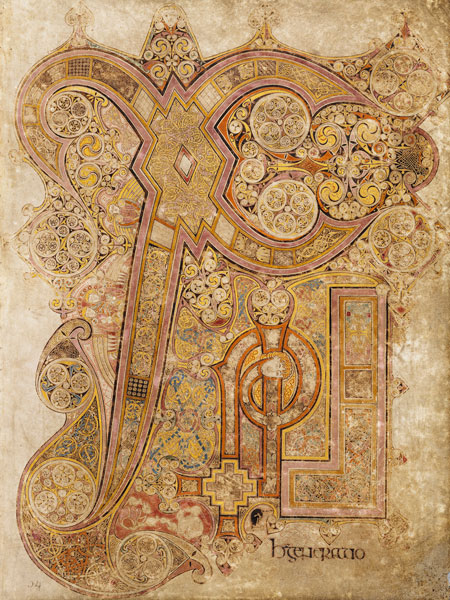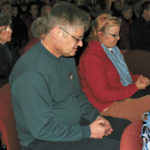“The Written Word Endures” is the motto of the National Archives here in the United States. As a culture and a country, we place great value on the preservation of books and manuscripts that are the hallmarks of American society.
That same reverence for words on paper can be found in Ireland — the home of great literary works and precious works of history and culture. Not surprisingly, the Irish people here in Iowa and around the world take great pride in these scholarly treasures.

This is a page from the Book of Kells file 291v.
At the end of this summer, Messenger readers — and even the merely curious — will see some of these works as part of a pilgrimage to Ireland with Bishop Thomas Zinkula. The tour includes stops at a number of historic sites and the celebration of Mass each day with Bishop Zinkula presiding.
The group also will receive a guided tour of Dublin with a special visit to the library of Trinity College. Often referred to as Ireland’s “front room,” the library is the home of the ninth century manuscript known as the Book of Kells. Tour visitors will be able to see — but not touch — some of the pages of this extraordinary manuscript.
The book is impressive, indeed. Written in ancient Latin, the Book of Kells records the four Christian Gospels on pages of “vellum” made from calfskin. These pages — referred to as “leaves” — are illuminated with bright, beautiful, sacred images. Bound and tooled in leather, the book is one of the great icons of western civilization.
Seeing a few leaves of this book will be a special event. The great hall that serves as the setting for the book commands decorum from the million individuals who visit annually. The “Long Room,” as the hall is known, is like no other. Some say it seems more like a cathedral than a library!

The pilgrims who join Bishop Zinkula may be among the last visitors to the Long Room before the entire library undergoes a much-needed restoration. It’s been more than 300 years since the building opened and both the structure and the holdings have suffered due to climatic and human detritus.
Indeed, visitors can even smell the deterioration. The air in the Long Room has a sweet aroma — like almonds — which comes from aging paper, parchment, vellum and leather. The staff knows that better heat and humidity controls are needed to stop the degradation.
The project will be substantial. The current plan is to move more than 750,000 books and manuscripts to safe storage to allow for the restoration of the building itself. With the collections off site, each item will be examined, cleaned and repaired, as necessary.
Each book and manuscript will be fitted with a “radio frequency identification tag” that will provide for better service and security. Not surprisingly, the work will be labor-intensive and take a 50-person staff approximately five years to complete a multitude of tasks.
Moving so many extraordinary works will require the planning of a military operation. Further complicating the process is the commitment to provide limited access to students, scholars and special visitors. Who knew that books and manuscripts could cause such a headache!
The decision to move forward and address the multitude of these challenges is necessary. The recent and dramatic fire at the Cathedral of Notre Dame in Paris gave the project a sense of urgency. “We need to conserve the building and the collection for its fourth century,” notes the library director with a sense of determination.
The Catholic Messenger’s “Faith of the Irish” pilgrimage is scheduled Aug. 31-Sept. 9. Contact Select International Tours at (800) 842-4842 or marianne@select-intl.com to learn details about the trip and cost. Also, visit the website at selectinternationaltours.com. On the main page, find the phrase “Find your trip” and type in Bishop Thomas Zinkula. That will take you to the pilgrimage brochure, with the opportunity to register.
Ireland and the extraordinary Book of Kells call out to you.
(Timothy Walch is a lay director for St. Thomas More Parish in Coralville and a member of The Catholic Messenger’s board of directors. He is also the author of “Irish Iowa,” 2019.)











